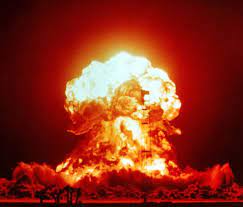Philip Johnston
Barbie or Oppenheimer was the weekend cinematic choice, so lacking anything pink to wear, or not in public at any rate, we opted for the Christopher Nolan biopic of the father of the A-Bomb. It was a sobering experience, a three-hour trip through the mind-boggling weirdness of quantum physics and Oppenheimer’s tortured soul, with a cacophonous soundtrack characteristic of the director (Batman, Dunkirk, Inception and so on) the one downside. The events were dramatic enough without overlaying them with loud music that sometimes made the dialogue hard to hear.
Nonetheless, this is a powerful film, especially to those of my generation. We grew up during the Cold War under the shadow of the bomb, although, to be honest, Oppenheimer’s name never featured a great deal in my childhood. The individual we most associated with the bomb was Harry Truman, because he dropped it on Japan. Indeed, there is a scene in which the US president gets annoyed with Oppenheimer because the scientist feels he has blood on his hands for developing the weapon. The president tells him that using it was a political decision and Oppenheimer should stop playing the martyr. It’s not about you, says Truman. But it was, and about all those other scientists tasked with turning the miracle of nuclear fission into a weapon of mass destruction.
Oppenheimer’s guilt at having unleashed this horror is the central theme of the film. His famous words on realising the consequences, taken from the Hindu scripture, the Bhagavad Gita, feature prominently: “Now I am become Death, the destroyer of worlds.” His biggest concern after the war was the development by his erstwhile friend and Manhattan Project colleague Edward Teller of the hydrogen bomb, a device far more powerful that its predecessor, and the subsequent creation of a stockpile of weapons capable of wiping out mankind. As Churchill observed, while an A-bomb was manageable as an instrument of war, an H-bomb “carries us into dimensions which have never confronted practical human thought”.
From 1950 onwards, the ramifications became a key point of division in politics as well as the central diplomatic issue throughout the Cold War. In this country, the former manifested itself in the growth of movements such as CND, which had a big influence on the development of Labour Party policy. It was accompanied by farcical civil defence announcements which no one took seriously since we would have just four minutes’ warning of an attack. Hiding under the kitchen table seemed pointless. When a Coventry policeman in 1984 accidentally triggered a siren that sounded for 30 seconds, everyone stayed in bed.
By the 1980s, Labour was committed to unilateral nuclear disarmament, a policy still espoused by the party’s previous leader Jeremy Corbyn. Arguably, the prospect of leaving the UK defenceless was more responsible for the party’s heavy defeats in the 1980s than anything else. In 1987, it inspired one of the great Tory election campaign posters: a British soldier with his hands held high in surrender alongside the slogan: “Labour’s Policy on Arms.” Internationally, Cold War diplomacy was defined by the realisation that both sides had enough weapons to obliterate each other, so talks were needed to limit their production and ensure they were never used.
Watching Oppenheimer was to be struck by the fact that the threat remains as real as ever and yet no one seems to take it seriously anymore, not in the way they once did. There are no marches to Aldermaston, no women chained to the railings at Greenham Common, and no extant talks between the countries that possess these weapons over how to limit them. Once we all knew the acronyms, like Start and Salt, aimed at controlling strategic arms development; now we rarely hear of them. Pivotal meetings, including the summit between Ronald Reagan and Mikhail Gorbachev in Reykjavik, seem to belong to another age.
Yet there is a war in Europe in which the aggressor is armed to the teeth with nuclear weapons, while Ukraine is being supplied by Nato countries that rely on the US nuclear umbrella for their security. Why is there so little concern about the prospect of Armageddon when with Putin in the Kremlin it seems more likely now than it did back in the Soviet days? Perhaps we just don’t want to think about it; but misunderstandings can bring nuclear war perilously close to reality. In 1983, a real-time Nato wargame codenamed Able Archer so spooked the paranoid Soviets that they prepared their nuclear weapons for a strike on America.
Then again, nearly 80 years have passed since the only occasion these weapons were used in combat. Perhaps the concept of Mutually Assured Destruction is such a powerful disincentive to their use that it is no longer worth fretting about. Let’s worry instead about climate change or AI as the likely harbingers of the Apocalypse. But for all that our children are being told the world is about to go up in flames, it isn’t. We can always adapt to global warming, just as we can harness artificial intelligence to our great benefit. But a nuclear war really would mean the end of life as we know it, which was why Oppenheimer spent his remaining years after the war arguing for controls.
Of course, it might help if we stopped fixating on the end of the world at all, though existential angst has been part of the human condition since we lived in caves. But while the war in Ukraine and Putin’s mad ravings make any dialogue problematic, the fact remains that nuclear deterrence requires keeping open lines of communication even to potential enemies and embedding codes of conduct into formal treaties. Alarmingly, however, we seem to be going backwards. Russia’s reckless decision in February to suspend its adherence to the 2010 New Start treaty has put decades of progress in this field in jeopardy. Meanwhile, China is building up massive stockpiles and Iran is close to developing a bomb. Arms control was once a key objective of foreign policy and must be again, whatever else is happening in the world. The stakes are too high to let the process falter, as Oppenheimer well understood.
The Telegraph







